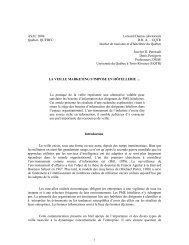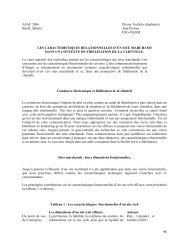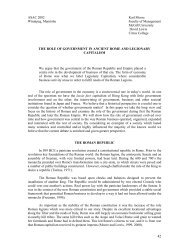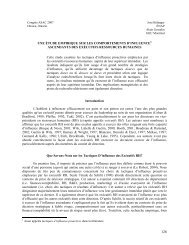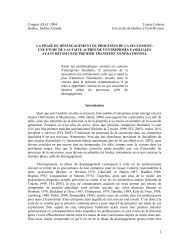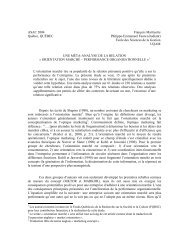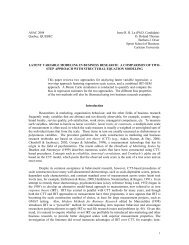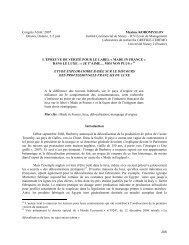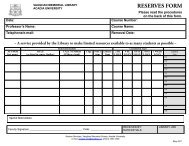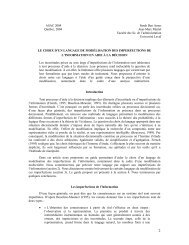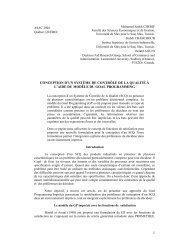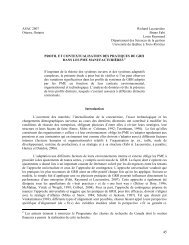ASAC 2004 – Quebec City Lynne Gillis – St. Francis Xavier ...
ASAC 2004 – Quebec City Lynne Gillis – St. Francis Xavier ...
ASAC 2004 – Quebec City Lynne Gillis – St. Francis Xavier ...
Create successful ePaper yourself
Turn your PDF publications into a flip-book with our unique Google optimized e-Paper software.
The fourth reason was the specific product details obtained that were not easily available from<br />
other sources. These ‘details’ or ‘little gems of wisdom’ would include such things as the proper<br />
time of day the product should be taken, what foods or beverages the drug should be taken with<br />
or what should be avoided. While physicians stated this type of information might not be obtained<br />
during every sales call, the information could prove to be beneficial in treating patients (i.e.,<br />
decrease side effects).<br />
The fifth common reason for meeting with PSRs was for social obligation reasons. Some saw it<br />
as a social ‘courtesy’ for prescribing the sales representatives’ products. Since physicians were<br />
using certain brands of drugs they felt somewhat obliged to meet with that company’s<br />
representative.<br />
The last reason for meeting with PSRs was because they were associates. Physicians felt longterm<br />
relationships allowed them to become familiar with a representative and knew what to<br />
expect from them. They would be able to discover if the sales representative was competent,<br />
dependable and honest in the information they were providing and whether they were reliable.<br />
The physician and PSR, having this long-term relationship, would be more likely to have open<br />
communication. All physicians also mentioned they did have some form of social and/or longterm<br />
relationships with particular PSRs who called on them.<br />
Tolerance: Physicians spoke of several reasons for not meeting with representatives or for<br />
limiting the number of PSRs they saw. In particular, they spoke about the information presented<br />
being biased, that there were too many reps, the reps were too aggressive, and the physicians<br />
were just too busy. To begin, physicians all had a similar opinion about the information they<br />
received from PSRs <strong>–</strong> the information had a strong reporting bias. This reporting bias was found<br />
in both the verbal detailing provided and the handouts given on the drugs being detailed (i.e.,<br />
company-performed studies, graphs, tables and diagrams). The physicians believed the<br />
information provided by sales representatives could not be trusted or taken at face value and<br />
therefore was not of much use.<br />
The other main reason for limiting access was that there were too many PSRs wanting<br />
appointments, many of whom were detailing the same drug. The physicians highlighted a recent<br />
trend towards pharmaceutical companies undertaking “sequential detailing.” Sequential detailing<br />
involves two or more representatives detailing to the same physician the same products. These<br />
representatives would be either from the same company or be representatives from companies<br />
that have formed an alliance to produce and market a pharmaceutical drug.<br />
The last reason for not wanting to see PSRs was that some reps were just too aggressive and the<br />
physicians were just too busy. The reps wanted to tell their whole story and the physicians only<br />
wanted a “reader’s digest” version.<br />
Theme Two <strong>–</strong> The ‘Weapons’ of Influence<br />
“The kind of marketing they do is kind of more aggressive than it use to be and<br />
perhaps a bit more subtle too.”<br />
Four influence techniques and strategies were found in the data that were commonly used by<br />
PSRs to sway physician-prescribing patterns. These four techniques and strategies were:<br />
pharmaceutical drug price/coverage; free product sampling; reciprocity; and likeability.<br />
Weapon 1: Price<br />
4




